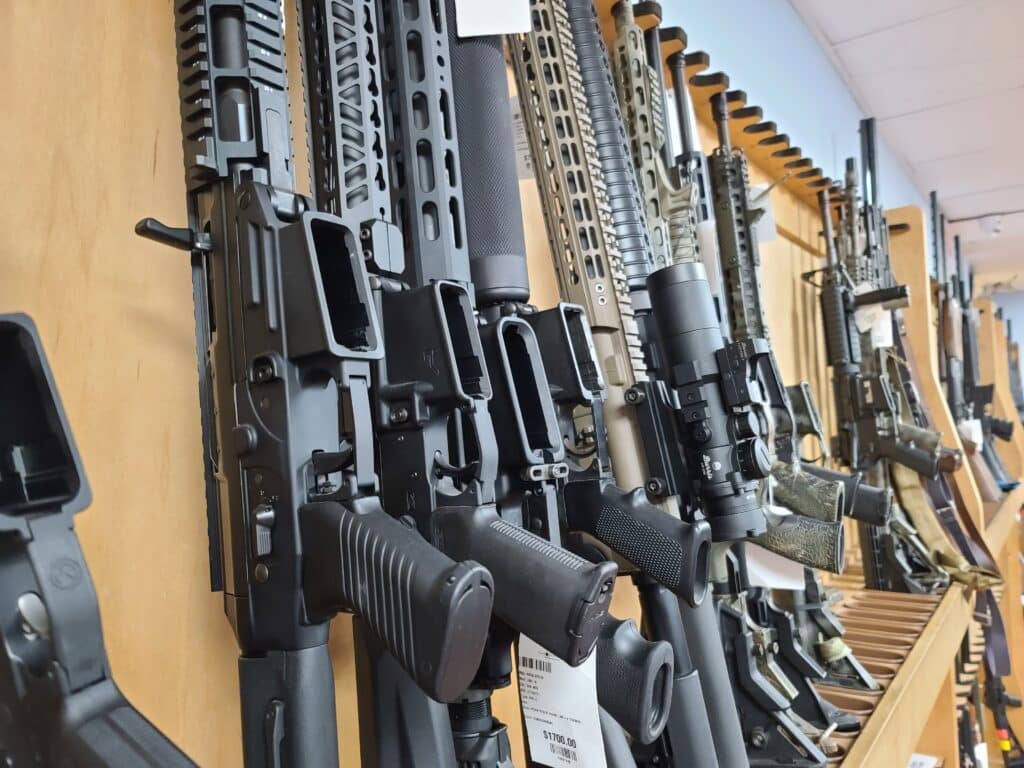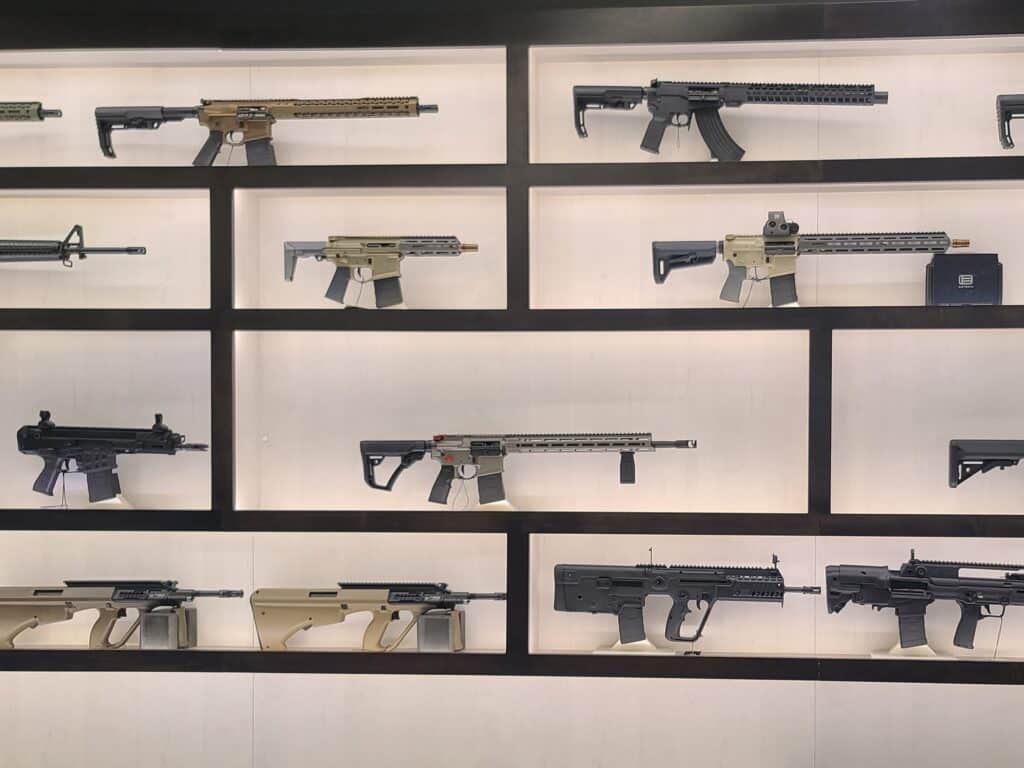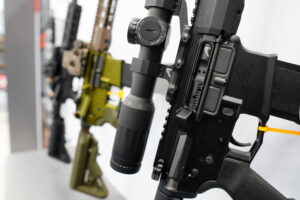The long-anticipated decision in the case against California’s AR-15 ban was delivered this week. Not only did it find the laws unconstitutional, it also offered a counter to the most popular argument federal judges have used to uphold similar bans in other states post-Bruen.
Contributing Writer Jake Fogleman dissects Judge Roger Benitez’s response to the idea certain banned guns and accessories aren’t “in common use.”
We also heard from a number of Jewish Americans about how they and many in their community are turning to firearms ownership in the wake of the Hamas attacks in Israel. But they’re not just turning to any guns. They want the kind of firepower that could counter the sort of assaults we’ve seen plastered across cable news and social media the last two weeks.
The most popular option for everyone who spoke with me for the story? The AR-15.
Plus, Yehuda Remer of The Pew Pew Jew joins the podcast to describe how much different this outpouring of interest in guns has been from previous anti-Semitic attacks.

Analysis: Judge Benitez Offers a Rebuke to ‘Common Use’ Argument Used to Uphold Gun Bans [Member Exclusive]
By Jake Fogleman
An increasingly common theme among judges who uphold hardware bans is the claim that “assault weapons” and “large capacity” magazines are not commonly used. Now, a judge who disagrees with those holdings has officially taken those claims head-on.
United States District Court Judge Roger Benitez ruled on Thursday that California’s ban on AR-15s and other so-called “assault weapons” violates the Second Amendment. He did so primarily because the State’s ban was an improper outlier in the country’s historical tradition of gun regulation. But he also devoted an entire section in the latter half of his 79-page opinion to address what he called “new arguments” in support of such hardware bans—namely that the arms they cover are not “commonly owned” or “in common use.”
“A new twist on an old argument is that standard AR-15-type rifles are not commonly owned by law-abiding persons for lawful purposes,” Benitez wrote. “An expert witness for the State suggests that although such rifles number more than 24.4 million among Americans, a smaller number of people (7.9 million) might own most of them.”
Judge Benitez countered by arguing that the State’s own estimate was more than sufficient to meet the threshold for commonality. He said the Supreme Court’s 2016 holding that the Second Amendment protects stun guns supported that conclusion.
“Seven million nine hundred thousand persons is still a large number of citizens choosing to own AR-15 type firearms,” he said. “When the Supreme Court vacated Caetano’s conviction for mere possession of a stun gun, 200,000 owners of stun guns was all it took.”
Benitez then turned to the claim that a rifle must actually be fired, specifically in a defensive gun use situation, to qualify as an arm “in common use.”
“The State suggests that standard AR-15-type rifles might be commonly owned, but are not used for self-defense,” he wrote. “The State says that there is no evidence that firearms equipped with the prohibited accessories or semiautomatic centerfire rifles of less than 30 inches in length are ‘commonly used’ for self-defense.”
This argument has gained prominence in the aftermath of the Supreme Court’s New York State Rifle and Pistol Association v. Bruen decision. Nearly every federal judge to uphold an assault weapon or magazine ban post-Bruen has raised the question of guns and magazines actually being utilized by citizens in self-defense situations–often even requiring that more defensive shots be fired than the mag limit to count towards the analysis.
“This Court finds that an individual’s subjective intent in purchasing a firearm or firearm accessory for self-defense, while relevant, also cannot be dispositive in assessing whether a firearm or firearm accessory is in common use for self-defense,” U.S. District Judge Karin Immergut wrote in an opinion upholding Oregon’s magazine ban. “The objective evidence shows that having more rounds does not facilitate self-defense because those rounds are rarely, if ever, used.”
Some have even based their rulings entirely on this question.
“Plaintiffs’ proposed ownership of assault weapons and LCMs is not protected by the Second Amendment because they have not demonstrated that the specific assault weapons and LCMs in the Challenged Statutes are commonly sought out, purchased, and used for self-defense,” Judge Janet Bond Arterton wrote in Flanigan v. Lamont, a case challenging Connecticut’s hardware bans. “In the absence of persuasive evidence that the assault weapons or LCMs listed in the statutes are commonly used or are particularly suitable for self-defense, Plaintiffs have failed to carry their burden.”
Benitez, however, dismissed the argument as little more than “a word game.” He said California failed to provide evidence that AR-15s are not commonly used, which he said was the government’s burden to prove.
“The burden is on the government to prove that remarkable claim,” he wrote. “It does not take a Nobel laureate to figure out that if Americans own 400 million guns and 400 million gun crimes are not being committed, that Americans are using their guns for something other than crime. If Americans own 24.4 million AR-15s and 24.4 million gun crimes are not being committed with AR-15s, Americans must be using them for lawful purposes.”
He also cited other lawful uses for AR-15s beyond defense, like “hunting or sport or target practice.” But even under the narrow parameters of self-defense purposes, Benitez likened the “use” of AR-15s to the way most people use other precautionary safety equipment.
“Probably the vast majority of Americans that own guns keep them and use them for self-defense the same way that a driver puts on a seat belt in the case of a collision,” he wrote. “Though collisions rarely happen, the seat belt is used for protection and to be ready for the unexpected collision. A reserve canopy is being used on a parachute jump, although it is not deployed, in case the main parachute fails. A cell phone in one’s pocket is being used when waiting for a telephone call or when one might need to make a call. An AR-15 under one’s bed at night is being used for self-defense even when the night is quiet. A person may happily live a lifetime without having to fire their gun in self-defense. But that is not to say that such a person does not use their gun for self-defense when he or she keeps it under the bed with a hope and a prayer that it never has to be fired.”
Finally, he argued that appeals to empirical evidence purporting to show specific arms being used in defensive encounters—the quality of which he called into question for being reliant on hearsay and incomplete news reports—did not comport with how the Supreme Court arrived at its Heller decision striking down handgun bans.
“If the test was concerned with the actual firing of a weapon, the Heller court would have looked at statistical averages about how often handguns were fired for self-defense,” Benitez wrote. “The statistic was never mentioned.”
Podcast: Jewish Americans Turn to Guns After Hamas Slaughter (Ft. The Pew Pew Jew) [Member Early Access]
By Stephen Gutowski
This week, we’re discussing how the unprecedented terror attacks in Israel have motivated Jewish people in America to seek out firearms.
Our guest is a longtime Jewish gun-rights advocate who lives in Texas. Yehuda Remer, who goes by The Pew Pew Jew, joins the show to detail the incredible increase in demand for guns and training he’s seen from people in his community.
He said the influx has been unlike anything he’s experienced. Remer said the number of people he’s had reaching out to him and, importantly, following through on their desire to obtain guns is leaps and bounds beyond any previous high-profile anti-Semitic attack.
He said he believes the fallout from the Hamas killings could be creating a sea change in how American Jews feel about being armed.
Plus, Contributing Writer Jake Fogleman and I discuss the federal ruling striking down California’s AR-15 ban.
You can find the show on your favorite podcasting app or by clicking here. Video of the episode is available on our YouTube channel. Reload Members get access on Sunday, as always. The episode will go public on Monday.

Jewish Gun Owners Turning to Heavier Weapons After Hamas Slaughter [Member Exclusive]
By Stephen Gutowski
As the Jewish community reels from the unprecedented terror attacks in Israel, some are reevaluating what kind of firepower they need to feel safe.
“It’s like having a serial killer show up in your shower next to you. It’s a place where you know you’re vulnerable, but you’d never think anything’s gonna happen there. And it just rattles you to the core. For me, it rattled me to the core,” Ross, who works at a software company in the Chicago suburbs and asked not to be named for safety reasons, told The Reload of the effect of the October 7th attacks. “I’ve heard the same from many other Jewish friends of mine.”
He said he bought a pistol for the first time after the 2020 riots ended up outside his home but is planning to upgrade in the wake of Hamas killing more than 1,400 Jews in Israel. It’s part of a trend of American Jews who are not just arming themselves but rethinking the sorts of guns would be most useful if they had to face down an attack like the one Israelis experienced.
“People historically say, ‘Well, why do you need a gun? This is America. You have the police. Like, you don’t need this. It’s part of the problem.’ And I think what we saw in Israel is that if you have a group of people that are determined to come into your home and commit harm, first of all, if you don’t have a gun, good luck,” Ross said. “And, even if you have like a little pistol, sorry to say, that’s not gonna cut it. I’m planning on purchasing more firearms at this point.”
Rabbi Jossi Eilfort, president of the Jewish security non-profit Magen Am, told The Reload he’s been hearing the same thing from many other Jewish residents in California as well.
“I had three or four calls today that were, ‘Hey, which AR-15 should I buy?” he said. “And we’re in California, so we’re talking feature list and muzzle brakes. And, like all the things you need to do to be able to buy a rifle in California. But people who have no knowledge of the industry are digging in and like, ‘well, I researched that Saint is better than the other option.’”
Even people without experience considered getting an AR-15 to try and pull guard duty at Jewish institutions.
“I had someone call me and say, ‘Hey, should I borrow my friend’s AR-15 and bring it to synagogue this weekend?’” Eilfort said. “And I know this person has zero training. So it’s like, ‘Please don’t do that. Like, we have a security team. I’ll give you some pepper spray. Come train with us. But please don’t do that.’ But that’s a real sentiment.”
Joshua, a Los Angeles physician who also asked that his real name not be shared, is in the same boat. He said when he bought his first gun this week, it was an AR-15 variant.
“Originally, I was thinking of getting a semi-automatic handgun,” he said. But he was soon persuaded that the semi-automatic rifle would be a better option if he ever had to defend his family from multiple home invaders like those who rampaged across multiple Israeli kibbutz.
“I never bought a gun before,” he told The Reload. “So the gentleman said to me, what do you need it for? Because I had some ideas in my head about what I wanted. And he said, ‘No, no, no, don’t tell me what you want. Tell me what you need it for. I said, ‘Well, you know, I’m concerned about what’s just happened in Israel.’ He said, ‘So, you want it for personal protection in the home if something goes bad?’ And he said, ‘Okay, do you want an AR-15?’ And that’s what I got.”
David Rice, a bond trader who became a gun-rights advocate in the wake of the 2020 riots, said he too had upgraded his regular defense strategies. While he already owned AR-15s, he decided to keep one closer by after the Hamas attacks because he and his wife realized how easy it would be to target them and their neighbors as Jews.
“Normally, I leave everything but my CCW in the basement safe and keep my CCW in a Vaultek in the bedroom. Last night my wife and I talked about how we have a large and visible Mezuzah on our front door and decided to bring one of the ARs to the bedroom,” he said of the traditional verse found outside many Jewish households. “While American Jews generally aren’t hanging huge Israeli flags on their front porch, many many many Jews that aren’t even involved in Jewish life have Mezuzahs on their doors. From discussions I’m having with other parents and neighbors, that makes them feel identifiable and thus vulnerable to attack.”
Ross said that vulnerability is what’s driving him to expand the number of guns he owns. He said he never wants his family to be forced into a position where they don’t have the firepower needed to defend themselves.
“I always heard this idea. It’s like, ‘Come on, okay, you want to own guns? Fine. But are you crazy? Are you defending yourself against an army?’ And now my mind is changed on that,” he said. “It’s like, ‘Yeah, I want to feel I have the horsepower I need.’ So, I’m likely going to buy a shotgun. I’m likely going to buy a heavier handgun.”
Eilfort said he was glad to see Jewish Americans starting to take their security into their own hands as much as possible. But he lamented that it took such a horrendous act of terror to get to this point.
“I wish we were more prepared before, is how I feel about this,” he said.
As for Joshua, he ended up with a semi-auto handgun to complement his AR. And his wife got a revolver too for good measure.
“If Israel laid down their arms there would be massive slaughter of every Jew in Israel. If the terrorists put down their arms, we would have peace,” he said. “So, that brings us back to our points here. I’m not putting down my arms. I’m becoming armed so that I’m prepared just in case something happens here.”
That’s it for now.
I’ll talk to you all again soon.
Thanks,
Stephen Gutowski
Founder
The Reload







